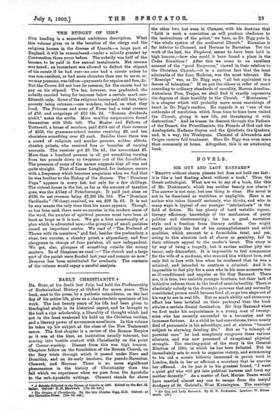EARLY CHRISTIANITY.t
DR. BIG, at his death last July, had held the Professorship of Ecclesiastical History at Oxford for seven years. This book, sent to the press, by a pathetic coincidence, on the last day of his actfve life, gives us a characteristic specimen of his work. The last twenty years of his life had been given to theological study in its historical aspect, and he brought to the task a ripe scholarship, a liberality of thought which had not in the least weakened his hold on the Christian verities, and a literary power of no common excellence. In this volume lie takes up his subject at the close of the New Testament canon. The first chapter is a review of the Roman Empire e,s it was at the time, an institution usually tolerant, but coming into hostile contact with Christianity on the point of Caesar-worship. Dissent from this was high treason. Chapters follow on the foundation of the Roman Church, on the fiery trials through which it passed under Nero and Domitian, and on its early teachers, the pseudo-Barnabas, Clement, and Hermes. There is no more significant phenomenon in the history of Christianity than the fall which we experience when we pass from the Apostolic to the sub-Apostolic writings. Clement stands far above *4 Bubsidy CoUseted is the Diouse of Lincoln in 1826. Edited by the Bee. H. &Aar. Oxf ord B. H. mackwen. [12s. 6d, net] t The Origins of Christianity. By the late Charles Bigg, D.D. Orford: at the Clarendon Press. [12s. 6d. net.]
the other two, but even in Clement, with his doctrine that "faith is such a conviction as will produce obedience to the instructions of the priest," we have, as Dr. Bigg puts it, "the whole system of the mediaeval Church." Barnabae is far inferior to Clement, and Hermas to Barnabas. Yet the work of the last, the Shepherd, seems to have been held in high honour,—how else could it have found a place in the Codex Sinaiticus? After this we come to an excellent account of the "good Emperors," viewed in their relation to the Christian Church,—it is a curious fact that the least admirable of the four, Hadrian, was the most tolerant. His "Rescript " was, as Dr. Bigg says, "all but equivalent to a decree of toleration." If we put the others in order of merit according to ordinary standards of morality, Marcus Aurelius, Antoninus Pius, Trajan, we shall find it exactly represents the degrees of their hostility to the Church. " Montanism " is a chapter which will probably move some searchings of heart in Dr. Bigg's readers. He regards it as "one of the outbreaks of mysticism which from time to time have visited the Church, giving it new life, yet threatening it with destruction." And he traces its descent through the Fathers of the Desert, the Priscillianists, the Friends of God and the Anabaptists, Madame Guyon and the Quietists, the Quakers, and, in a way, the Wesleyans. Clement of Alexandria and Origen receive full treatment. Here Dr. Bigg was even more than commonly at home. Altogether, this is an awakening book.














































 Previous page
Previous page